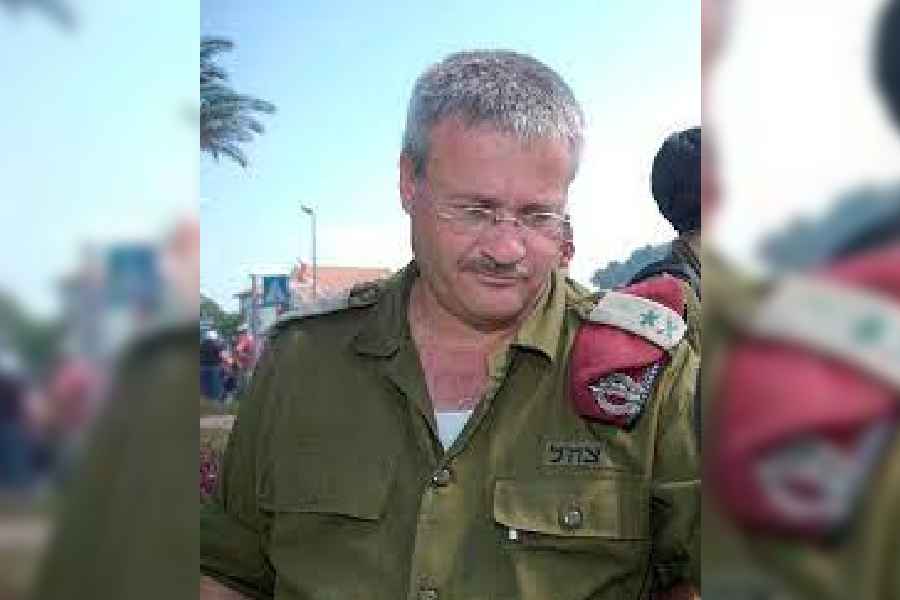Israel Ziv, a retired Israeli army general, was taking a bike ride on Saturday morning when a flood of alarming calls started coming in.
A huge barrage of rockets had been fired from the Gaza Strip. Gunmen from Hamas, the armed Palestinian group that controls the territory, were pouring across the border. Soon he would learn a friend’s son was trapped in a kibbutz.
He raced home, put on his uniform and grabbed his weapon, a 9 mm pistol.
Within minutes he was flying down a deserted highway in his new white Audi. As he neared the Gaza border, columns of black smoke rose in front of him, and the Israeli army, at least at first, was nowhere to be seen. Hamas attackers were running across the landscape, hunched under the weight of heavy machine guns and rocket-propelled grenade launchers, shooting at him.
“They were all over,” he said. “Hundreds of them.”
Ziv, stocky, spiky-haired, a bit irascible, and the former head of the operations directorate of the Israel Defence Forces, is a well-known figure in Israel, especially now. His actions over the weekend — driving head-long into the battle zone armed only with a pistol, organising a confused group of soldiers into a fighting unit and overseeing evacuations — have been widely publicised on Israeli news channels. In the process he has become an avatar of Israel’s DIY spirit — and of the failure of its military and intelligence agencies.
The Israeli government said the toll in the devastating incursion by Hamas had reached 1,200 people killed, most of them unarmed civilians.
Already, amid the anguish over the slaughter, public frustrations are beginning to boil, with many Israelis, Ziv among them, taking issue with the government of Prime Minister Benjamin Netanyahu.
“The government is totally paralysed,” said Ziv, who, even before this crisis, was extremely critical of Netanyahu for what he said were policies that bitterly divided Israelis and put the country’s security at risk.
Nevertheless, Ziv is still welcome in Israel’s corridors of power. On Wednesday, he held several teleconferences with captains of industry about raising tens of millions of dollars to help victims and their families.
“Just for civilians,” he shouted into his phone. “None of it for the army.”
He spoke to the top brass of the military and the police about shoring up a civilian defence force that had clearly been overwhelmed.
He even walked into Israel’s defence ministry, where he met defence minister Yoav Gallant and held secret meetings with national security officials in which they left their mobile phones on the hallway floor before stepping inside a small office for a chat that, the hope was, could not be tracked.
So weakened is public faith in the country’s military that one of the biggest issues Israelis are talking about is arming themselves. Many already own weapons, but the government announced this week that it was purchasing 10,000 assault rifles for civilians, along with bulletproof vests. Ziv is spearheading an effort to empower retired generals and former soldiers to rebuild community defence squads in the Gaza border area and around the country.
“We need weapons,” one man pleaded with Ziv as he visited a massacre site Wednesday. “And we need a system.”
Ziv put a hand on the man’s back and said, “We are putting together that system right now.”
His account of what he did on Saturday has been backed up by other retired generals and active duty officers who fought with him over the weekend. He left his house, a beautiful home overlooking olive groves near Tel Aviv, and arrived in the battle zone around 10am (local time). He was travelling with a close friend, Noam Tibon, a retired general whose son was trapped in the Nahal Oz kibbutz.
Tibon’s son, a journalist, had called his father in deep distress, saying gunmen were closing in on him and his family. In recent media interviews, Tibon said he told his son: “Trust me, I will come. This is my profession.”
New York Times News Service











